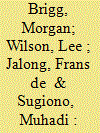| Srl | Item |
| 1 |
ID:
145527


|
|
|
|
|
| Summary/Abstract |
Indonesia's normative leadership at the 1955 Asian-African Conference was grounded in anti-colonialism that became part of the ‘Bandung spirit’. However, the shape of Indonesia's recent leadership, following its remarkable democratisation, is harder to fathom. In response, this article suggests that Indonesia's regional and international engagements can be usefully understood through the lens of shifting domestic efforts to navigate unity with diversity, including as this is reflected in long-standing foreign policy commitments. Empirical reference points include the management of conflict in the Indonesian democratic transition, the place of civilian militias in Indonesian political life, and the Bali Democracy Forum. The case is made that Indonesia exhibits a remarkable embrace of diversity alongside substantial illiberality—a pattern that generates a flexible form of liberalism which presents difficulties, but also suggests particular opportunities for Indonesian leadership. Considering Indonesian navigation of unity with diversity enables a better understanding of the current and potential future shape of Indonesian leadership than analyses that rely on macro-level expectations of democratisation drawn from dominant liberal understandings of democracy and political order. This is in part because of the continuing salience of commitments to diversity, independence and cooperation that were articulated at Bandung in 1955.
|
|
|
|
|
|
|
|
|
|
|
|
|
|
|
|
| 2 |
ID:
152096


|
|
|
|
|
| Summary/Abstract |
This paper aims to analyse why Indonesia projects democracy as a state identity by taking on the role of democracy promoter? This paper argues that Indonesia's aspiring role as a democracy promoter is not a manifestation of a firm and coherent democratic political culture, which is more likely to be a permanent feature of states. Thus, rather than seeing it as firmly established state identity, instead, Indonesia's democratic identity should be seen as role conception articulated by foreign policy elites in its quest for international prestige. Its role as a democracy promoter has enabled Indonesia to enhance its other roles conceptions such as a regional leader in Southeast Asia as well as a bridge-builder at the global level. However, this paper further argues that Indonesia's role as a democracy promoter has also been hindered due to the inter-role conflicts arising from its enactment of multiple roles. As a result, Indonesia's enactment of the role as democracy promoter has relatively less impactful towards democratization in the region. To substantiate this argument, the paper examines Indonesia's strategies in promoting democracy and human rights in three case studies, namely Indonesia's role in mainstreaming human rights in ASEAN, Indonesia's democracy promotion through the Bali Democracy Forum, and Indonesia's engagement towards democratization in Myanmar.
|
|
|
|
|
|
|
|
|
|
|
|
|
|
|
|